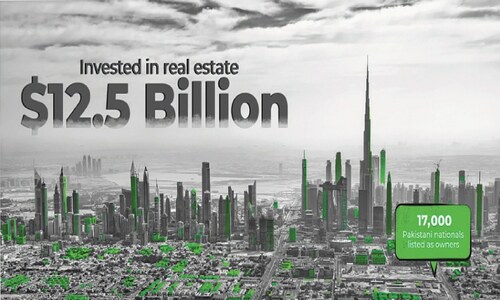Freedom of expression is under threat. Defence Minister Khawaja Asif warns media persons and social media users that they could go to jail if they share ‘secret’ information that hurts Pakistan’s ties with “friendly and brotherly countries”.
Does this apply to reporting and commenting on Dubai Unlocked, popularly known as Dubai Leaks? Well, it depends on who reports and who comments.
Thanks to a comprehensive Dawn report, we all know that thousands of Pakistanis, including political, media, military and business elite, own properties worth $12.5 billion in Dubai.
The occasional surfacing of facts regarding the Pakistani elite amassing tonnes of wealth abroad begs a fair question: why don’t they invest in Pakistan — their homeland that made them the wealthiest people among a population of 240 million?
Putting the economy back on the growth track is only possible if the state focuses on transparent proceedings and allows the media and judiciary to do their jobs
Unless our institutions that make up the state of Pakistan do some honest soul-searching and come up with a straightforward answer to this question, political and administrative chaos will continue to ruin Pakistan’s economy. Meanwhile, Islamabad — and, by extension, Rawalpindi — will remain dependent on external loans offered by international financial institutions and ‘friendly and brotherly countries’.
This dependence will lead to Pakistan’s decreasing influence in regional and global affairs and further deteriorate democratic values back home. The hybrid democracy currently being practised in the country will gradually lose essential democratic elements, and after a while, we may end up living in a repressive regime.
However, transparency in conducting state affairs and freedom of expression may help the country escape this undesirable future because these two elements can build a national spirit that identifies problems and moves toward solutions.
If that happens, the economy could be put back on the growth track. The country could also gradually decrease its reliance on foreign funding and make the best use of its domestic resources. What is needed, though, is clarity of purpose and honesty of intention.
The State Bank of Pakistan (SBP) has said in this fiscal year’s second quarterly report (October-December 2023) that there is still hope for the country to post a two per cent to 3pc economic growth rate this fiscal year ending in June. Current readings of all macro indicators suggest that the lower side of the projection is realistic.
Dependence on ‘friendly’ countries will lead to further deterioration of democratic values
A 2pc growth in the economy between July 2023 and June 2024 will still leave millions of people jobless. However, that may provide a starting point for the economy to show more resilience in the next fiscal year.
The SBP’s projected goal of bringing inflation down in the range of 5-7pc could be achieved as early as September 2025. Year-on-year headline inflation in April stood at 17.3pc, but the inflation reading for 10MFY24, from July 2023 to April 2024, was 25.9pc.
The government has recently told the International Monetary Fund (IMF) that it plans to continue energy price hikes, which will be practised from FY24 through FY25, to cut energy sector circular debts.
Furthermore, large-scale manufacturing (LSM) has only recently started rebounding, posting 2.04pc growth in March 2023 over March 2022 — though overall LSM growth in 3QFY24 rather receded by 0.1pc year-on-year.
The projected increase in energy prices and the late recovery of industrial growth mean that tackling inflation through increased supplies of goods and services would remain difficult in the next fiscal year.
What then encourages the central bank to say inflation would fall to 5-7pc by September 2025? Sluggish growth or outright contraction in aggregate demand plus a high base effect of high inflation throughout this calendar year.
And why is the central bank thinking along these lines? That is not difficult to comprehend: Pakistan is keen on negotiating a potential three to four-year, $7bn to $8bn IMF loan. The actual tenure and the loan size would depend, among other things, on whether the IMF packages the loan with concessional environmental financing.
In either case, the possible IMF loan conditions — some of which have already been leaked to the media — would focus more on stabilising the economy and less on growing it.
This means that in the initial years of the programme, people and businesses will have to pay more taxes but will incur few development expenses. Energy prices will continue to rise, high interest rates will not come down dramatically, and the overall environment for business expansion and an increase in aggregate demand will not be conducive.
In the later years of the programme, one can expect a more enabling environment for business growth and an increase in demand, which will remain tied not only to the IMF loan conditions but also to Pakistan’s position in geopolitics.
Most politicians on the treasury and opposition benches understand the gravity of the situation. But, the problem is that instead of strengthening democratic norms to find a practical, sustainable response to the challenges, they engage in divisive politics that suit the establishment.
This behaviour only strengthens the so-called hybrid democracy to which the nation is being made accustomed. The first targets of this overly manipulated system of democracy are freedom of expression and civil liberties guaranteed under the Constitution.
Published in Dawn, The Business and Finance Weekly, May 20th, 2024














































Dear visitor, the comments section is undergoing an overhaul and will return soon.